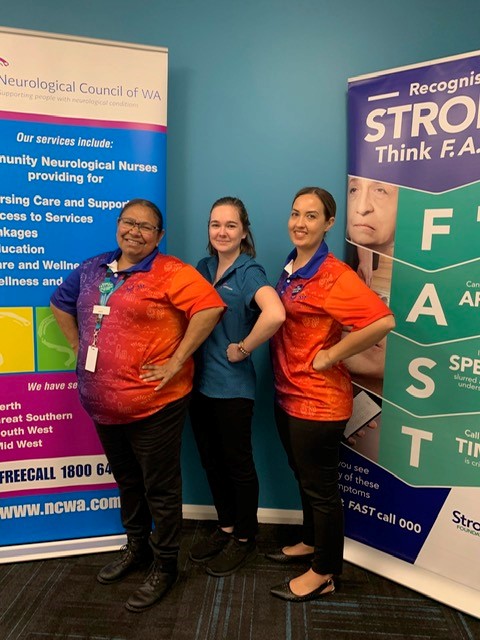Aboriginal Brain Injury Coordinators are FAST Heroes
This National Stroke Week (Aug 31-Sept 6) Stroke Foundation has teamed up with Western Australia’s Aboriginal Brain Injury Coordinators to help more people become F.A.S.T. Heroes.
A F.A.S.T. Hero is anyone who can help save a life simply by knowing how to recognise the F.A.S.T. (Face. Arms. Speech and Time) signs of stroke.
Western Australia’s Aboriginal Brain Injury Coordinators, including Rebecca Clinch, Renee Speedy, Maureen Merritt and Rachel Zaro, are part of the Healing Right Way study and work with Aboriginal stroke survivors in metropolitan, rural and remote areas.They are based at the Neurological Council of Western Australia (NCWA) in Perth or the Aboriginal Community Controlled Health Services throughout the state.
They keep the stroke survivors, their families and communities in touch with available stroke services, act as advocates when services aren’t accessible, and support survivors throughout their recovery journey.
This National Stroke Week, the Coordinators are sending out F.A.S.T. posters and magnets, giving presentations and talking about the F.A.S.T. message with their patients. By sharing this life-saving message, they are F.A.S.T. heroes.
Healing Right Way Chief Investigator Professor Beth Armstrong from Edith Cowan University said the Coordinators were proud to be involved in National Stroke Week.
“The burden of disease for stroke is 2.3 times as high for Aboriginal and Torres Strait Islander people compared with non-Indigenous Australians,” Professor Armstrong said.
“We know the more people who learn the F.A.S.T. message, the better. If you get to hospital quickly after stroke, the faster you can be treated and the more chance you have of making a full recovery.
“Involving Aboriginal health professionals in stroke care from prevention through to rehabilitation is vital to ensure the cultural security of stroke services for Aboriginal people.”
Stroke Foundation Western Australia State Manager Jonine Collins thanked the Aboriginal Brain Injury Coordinators for helping share the F.A.S.T. message and encouraged others to be F.A.S.T. heroes too.
“Stroke can happen to anyone, anywhere and at any time,” Ms Collins said.
“When a stroke happens, it kills up to 1.9 million brain cells per minute, but medical treatments can stop this damage.
The vital first step in accessing these treatments is recognising the F.A.S.T. stroke signs and calling triple zero (000) straight away.
“Anyone who can remember the F.A.S.T message can be a hero. Please learn it and help us by sharing it with your family, friends and colleagues. It could save a life,” Ms Collins said.
Think F.A.S.T and ask these questions if you suspect a stroke:
Face – Check their face. Has their mouth drooped?
Arms – Can they lift both arms?
Speech – Is their speech slurred? Do they understand you?
Time – Time is critical. If you see any of these signs, call triple zero (000) straight away.
Stroke is one of Australia’s biggest killers and a leading cause of disability. Most strokes show one or more of the F.A.S.T. signs.
This National Stroke Week, Stroke Foundation is encouraging Australians to share the F.A.S.T. message with others safely – through conversations, social media, by getting creative and holding a virtual event or even by printing a F.A.S.T. poster from our website and displaying it in the front window of your home.
It is also an opportunity for stroke survivors to acknowledge and celebrate their own F.A.S.T. heroes on social media using #strokeweek2020 or for workplaces or community groups to book an online StrokeSafe presentation.
More on National Stroke Week.

Image: Aboriginal Brain Injury Coordinators Rebecca Clinch and Renee Speedy with NCWA Neurocare nurse colleague Kiera Perrin.
